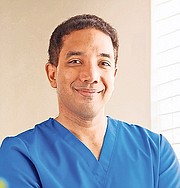By Dr Greggory Pinto
Here is an early Christmas gift of scientifically based facts for Bahamian men:
Frequent sex, more specifically ejaculating more than 21 times a month, has been shown in several studies, including a Harvard study, to reduce prostate cancer risk.
The Harvard ejaculation study, part of the Health Professionals Follow-up Study, involved health care provider volunteers, including pharmacists, veterinarians, optometrists, ophthalmologists, podiatrists and dentists. The study involved 29,342 health professionals between the ages of 46 to 81 years old. Information was obtained from each of the volunteers with regards to the number of ejaculations per month in younger years (20 to 29 years old), middle age years (40 to 49 years old) and the specific year during which the information was requested. The health care provider volunteers provided information every two years, regarding lifestyle and average monthly ejaculations.
The study found that frequent ejaculations reduced prostate cancer risk.
In comparison with men in the study who had four to seven ejaculations per month, men who ejaculated 21 or more times a month, had a 31 per cent lower risk of prostate cancer. These remarkable findings stood up to the scientific statistical scrutiny over many years; with lifestyle factors and PSA blood test frequency taken into account.
An Australian study replicated the same findings as the Harvard study, that frequent ejaculations reduced prostate cancer risk. The Australian study involved 2,338 men less than 70 years old. Results showed that men who had 4.6 to 7 ejaculations per week ( 18.4 to 28 ejaculations per month ), reduced the likelihood of prostate cancer diagnosis by 36 percent, when compared with Australian men who ejaculated less than 2.3 times per week on average (9.2 ejaculations per month).
The Harvard study and Australian studies both lend themselves to the need for long term studies examining the link between prostate cancer and ejaculation frequency. The studies proved that there is a link between early adulthood ejaculation frequency and the occurrence of prostate cancer much later in life. The prostate gland is a male reproductive organ whose main function is to secrete prostate fluid, one of the components of semen. The theory is that emptying the prostate gland through ejaculating is a likely protective mechanism, in that harmful and potentially irritating substances are evacuated and not allowed to accumulate and possibly lead to prostate cancer formation.
One in six Bahamian men will develop prostate cancer in their lifetime. Many Bahamian men have many of the risk factors for not just prostate cancer but a more aggressive form of prostate cancer. Important risks factors for prostate cancer include African ancestry, high alcohol intake, obesity, high calcium and red meat intake and the BRCA gene 1 and 2 mutations.
Prostate cancer has an excellent cure rate of nearly 99 percent if the prostate cancer is detected at an early stage.
Bahamian men need to live a healthy lifestyle with a weekly exercise regime, a healthy balanced diet, alcohol intake in moderation so as to reduce the risk of prostate cancer and the risk of more aggressive prostate cancer.
Get an annual prostate specific antigen blood test every year starting at age 40 years old. Early detection of prostate cancer is the key to cure.
Bahamian men, ejaculating 21 or more times a month could also potentially reduce your risk of prostate cancer. Wives and partners, this is a scientifically proven fact.
Early Merry Christmas, men of the Bahamas!
• Dr Greggory Pinto is a board certified Bahamian urologist and laparoscopic surgeon. He has trained in Germany, South Africa and France, and is a member of the European Association of Urology. He can be contacted at OakTree Medical Center, #2 Fifth Terrace & Mount Royal Avenue. Telephone: (242) 322-1145 (6) (7); e-mail: welcome@urologycarebahamas.com, or visit the website:www.urologycarebahamas.com.





Comments
Use the comment form below to begin a discussion about this content.
Sign in to comment
Or login with:
OpenID